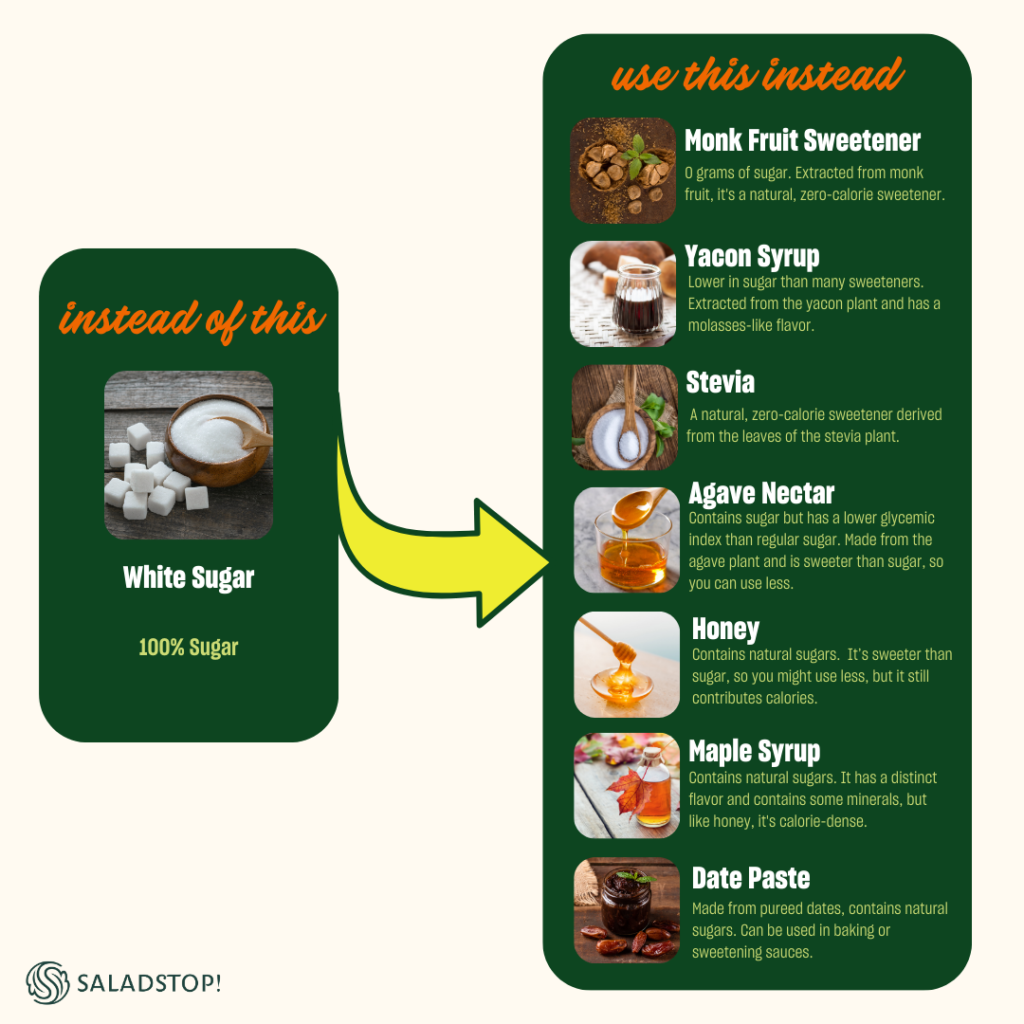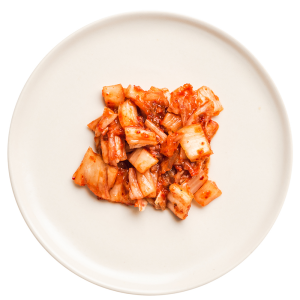In our fast-paced world, convenience often means grabbing a quick bite or a sweetened drink. However, many of these easy choices come with a hidden cost: added sugar. This sneaky ingredient finds its way into numerous products, impacting our health in ways we might not expect. From disrupting our energy levels to affecting our mood and long-term well-being, the effects of added sugar can be far-reaching. In this article, we’ll explore how added sugar impacts our bodies and offer practical advice for reducing its intake in our daily lives. Whether you’re looking to make minor adjustments or major dietary changes, understanding the role of added sugar is a crucial step towards healthier living.
The Basics
When we eat sugar, it mostly breaks down and gets absorbed in our small intestine. Here, special enzymes change the sugar into three simpler kinds: glucose, galactose, and fructose.
Our liver and muscles save some of the glucose as glycogen. This is a special kind of molecule that can change back into glucose when our body needs more energy.
But, when glucose goes into our bloodstream, it makes the amount of glucose in our blood go up. To handle this, the pancreas makes insulin, which helps glucose move to different parts of our body where it’s needed. However, if we eat a lot of added sugar, our cells might start to ignore insulin. And this is when the problems start.
Daily Recommendation
It’s recommended to limit daily added sugar intake to no more than 100 calories for women and 150 calories for men.
Health Implications
- Increased Hunger and Weight Gain
Eating a lot of added sugars can lead to increased hunger. This is because sugar, while tasty, doesn’t fill you up, especially when it’s in foods that lack protein, fiber, and healthy fats. As a result, your body quickly burns through the sugar, leaving you hungry and prone to more snacking.
Moreover, sugary drinks are linked to weight gain in both adults and children, but it’s not just about the extra calories. Added sugar can disrupt the balance of good and bad bacteria in your gut, affecting your metabolism and how your body processes fats and cholesterol.
Additionally, sugar can interfere with hormones that control hunger, like leptin. This disruption can lead to increased cravings for sugar and more hunger.
- Irritability and Depression
If you’re feeling moody or irritable, it might not just be stress; too much sugar could be the culprit. Studies suggest that added sugars can worsen mood and even lead to depression symptoms.
A high-sugar meal can spike your blood sugar, but then it crashes, making you feel tired and grumpy. Also, when your blood sugar drops after eating too much sugar, it affects your brain, which needs stable blood sugar levels to function properly.
If you find yourself getting irritable, especially after eating sugary foods, it’s worth looking at your sugar intake.
- Fatigue and Low Energy
Feeling tired and low on energy can sometimes be linked to the amount of sugar in your diet. Sugar provides a quick source of energy, but it’s used up fast. So, even if you eat a lot, you might find yourself hungry and low on energy again in about 30 minutes.
Additionally, big changes in blood sugar and insulin levels, which can happen after eating sugar, can cause your energy levels to drop, affecting how energetic you feel overall.
- High Blood Pressure
Too much added sugar in your diet might be a factor if you have high blood pressure. Studies have found a significant link between drinking sugary beverages and an increase in both high blood pressure and hypertension.
Although a direct cause-and-effect hasn’t been established, what is known is that high levels of glucose can harm the lining of blood vessels. This damage makes it easier for cholesterol to stick, leading to hardened blood vessels and, consequently, higher blood pressure.
- Skin Health
A diet rich in refined carbs and sugary foods and drinks is linked to a higher risk of acne. Foods high on the glycemic index, like processed sweets, raise blood sugar faster than those with a lower glycemic index.
Eating sugary foods can lead to spikes in blood sugar and insulin, which can increase oil production and inflammation, all contributing factors to acne.
Studies show that low-glycemic diets may reduce the risk of acne, while high-glycemic diets may increase it. For instance, one study found that fatty and sugary products, sugary drinks, and milk were associated with current acne in adults.
Additionally, population studies have observed that rural communities consuming traditional, non-processed foods have much lower acne rates compared to urban areas with diets high in processed and sugary foods. This supports the idea that diets loaded with processed, sugary foods may contribute to acne development.
- Diabetes
Diabetes has been rapidly increasing and is closely linked to sugar consumption. While sugar itself hasn’t been proven to cause diabetes, it indirectly raises the risk by contributing to weight gain and obesity, major risk factors for the disease.
Moreover, high sugar intake can lead to insulin resistance, elevating the risk of diabetes. Studies specifically point out that people who drink a lot of sugar-sweetened beverages, including soft drinks and fruit juices, have a higher likelihood of developing type 2 diabetes.
Easy Sugar Swaps
Swap Soft Drinks for Sparkling Water:
- Typical Soft Drink: Around 10-12 grams of sugar per 100ml.
- Sparkling Water: 0 grams of sugar.
Replace Sweetened Soy Milk with Unsweetened Soy Milk:
- Sweetened Soy Milk: About 6-8 grams of sugar per 100ml.
- Unsweetened Soy Milk: Usually less than 1 gram of sugar per 100ml.
Choose Fresh Fruit Over Canned or Dried Fruit:
- Canned Fruit (in syrup): Can have up to 20 grams of sugar per 100 grams.
- Fresh Fruit (e.g., an apple): Roughly 10-15 grams of natural sugars per 100 grams.
Opt for Plain Yogurt Instead of Flavored Yogurt:
- Flavored Yogurt: About 10-15 grams of sugar per 100 grams.
- Plain Yogurt: Usually 4-6 grams of natural sugars per 100 grams.
Swap Milk Chocolate for Dark Chocolate:
- Milk Chocolate: Around 50-60 grams of sugar per 100 grams.
- Dark Chocolate (70-85% cocoa): About 20-30 grams of sugar per 100 grams.
Use Natural Sweeteners Like Stevia Instead of White Sugar:

Swap Sugar-Sweetened Beverages for Unsweetened Tea or Infused Water:
- Sweetened Beverage: 10-12 grams of sugar per 100ml.
- Unsweetened Tea or Infused Water: 0 grams of sugar.
Choose Whole Grain Bread Over White Bread:
- White Bread: 2-3 grams of sugar per slice.
- Whole Grain Bread: Generally less than 1 gram of sugar per slice.
Opt for Homemade Dressings Over Store-Bought Ones:
- Store-Bought Dressings: Can have 5-10 grams of sugar per serving.
- Homemade Dressing (e.g., olive oil and vinegar): Virtually 0 grams of sugar.
Swap Regular Breakfast Cereals for Unsweetened Oatmeal:
- Sweetened Breakfast Cereals: 10-20 grams of sugar per serving.
- Unsweetened Oatmeal: Less than 1 gram of sugar per serving (add fresh fruit for sweetness).

Disclaimer:
At SaladStop! Group, our commitment is to empower every individual with reliable, evidence-based nutritional and wellness guidance. To earn your trust as your ultimate resource for nutritional information, our content undergoes rigorous nutritional scrutiny to ensure its accuracy, whether it’s about our offerings, culinary creations, or services. Please note that all information provided is for informational purposes only and should not be considered a substitute for professional medical or nutritional advice.




